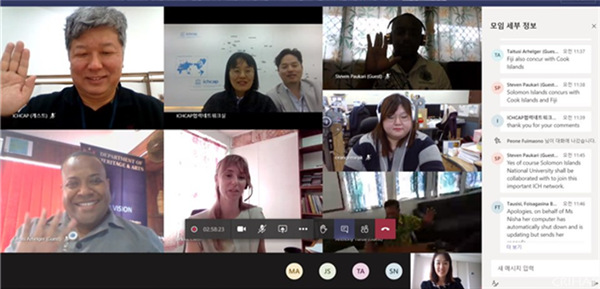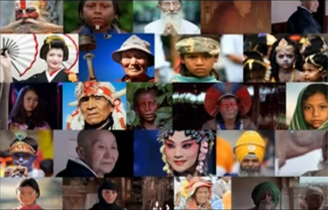Pacific ICH Network: An Opportunity to Create Means of Knowledge Exchange and Information-Sharing
 |
| The participants from the Pacific presented their ongoing efforts in relation to the implementation of the ICH Convention. |
On 28 October 2020, the International Information and Networking Centre for Intangible Cultural Heritage in the Asia-Pacific Region under the auspices of UNESCO (ICHCAP) and the UNESCO Apia Office co-organized the 8th Pacific Network Meeting that was held virtually. The aim of the meeting was to create means of knowledge exchange and facilitate information-sharing among the countries of the Pacific in relation to the implementation of the Convention for the Safeguarding of the Intangible Cultural Heritage.
The Network meeting brought together over 20 participants from 7 countries that presented their ongoing efforts in relation to the implementation of the ICH Convention, speaking on how they are addressing pressing challenges and how their work opens up various opportunities. This included information regarding the Draft National Framework for the Implementation of the 2003 ICH Convention in Fiji and the ways the country worked to involve youth in the implementation of the Convention.
With the current global pandemic as a backdrop, the meeting also aimed at raising issues related to the effects of COVID-19 on safeguarding intangible cultural heritage (ICH) in the Pacific. Most countries echoed the financial impact of COVID-19 on heritage work as funding was redirected to crisis response. In Samoa, a 50% cut to the budget was recorded as well as a shift of cultural activities towards the digital sphere with the development of virtual programming and the creation of digital linkages. In the Solomon Islands, the use of radio programmes that have been used during the pandemic to transmit traditional knowledge is another good example of adaptation.
At the same time, as was presented by Ms. Ellen Lekka, Culture Programme Specialist at UNESCO Apia, evidence from the recent Socio-Economic Impact Assessment shows that ICH, particularly traditional knowledge and coping mechanisms acquired from indigenous ways of life, has contributed to human resilience in facing severe challenges brought by the pandemic. Examples of this came from the Cook Islands as well as Tonga where a return to traditional cultural practices has been noted such as traditional agricultural practices and fishing.
The diverse tools ICHCAP has developed to enable and enhance the exchange of knowledge and facilitate the ways ICH practitioners and decision makers involved with the safeguarding of living heritage were presented by Ms. Boram Kim, Assistant Programme Specialist at ICHCAP. To grapple with alternative practices and emergent modes of delivery in various areas in ICH safeguarding during COVID-19, ICHCAP has organized various online events including ICH Webinar Series on Higher Education, 2020 World Forum for Intangible Cultural Heritage, Maritime ICH webinar, ICH NGO Conference (forthcoming), and Silk Roads Webinar and Network Meeting (forthcoming).
Meanwhile, Mr. Sangmook Park, Programme Specialist at ICHCAP introduced ichLinks, a one-stop, integrated ICH information-sharing platform as an effective vehicle for optimal data sharing and use and as a common ground for various ICH stakeholders to interact with one another. The platform will be launched and made available in March 2021.
Through the discussions it became evident that some of the challenges countries are addressing in their efforts to safeguard ICH are shared by more than one country. The involvement of youth and the need for capacity building were often raised as areas of focus. In addition, the role education has in the implementation of the Convention is also an area they are actively attending to. The opportunity presented through the Pacific ICH Network Meeting to share experiences was highly valued by the participants, as is the sense of collaboration that the virtual meetings allow.
Address: 81, Laiguangying West Road, Chaoyang District, Beijing, China
Zip Code: 100021
Tel: 86-10-64966526
Fax: 86-10-64969281
E-mail: administration@crihap.cn
NEWSLETTER
Leave us your e-mail address, we'll let you know about current events.


